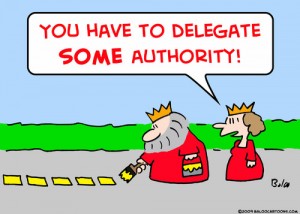
As you are promoted in an agency often your job changes shape and becomes more about leading a team and motivating and coaching others rather than trying to deliver all of the work yourself.
To be successful in your new role you need to understand that it requires a completely different skill set – and one that is rarely taught.
It can feel very uncomfortable entrusting a job/task/project to someone else when you know it’s something you could easily do yourself.
You may even be reluctant to let others handle something by themselves because you don’t trust that they’ll deliver to the same standards as you.
Those who don’t succeed at delegating effectively end up burnt out and with a very unhappy team because they are trying too hard to control everything and micro-managing everyone.
Here are five reminders for how to avoid the trap many managers fall into which is ‘it’s my way or no way’:
1. Get to know your team and let them get to know you
Your team are individuals with different backgrounds, levels of expertise, values and communication styles and therefore to get the best out of the team it’s your job to understand what makes them tick and what attributes they bring to the party.
Invite them for a coffee and ask them about their backgrounds, career aspirations, their strengths, how they think the team could work more efficiently etc etc. Get them talking about themselves and contributing ideas to the team’s overall objectives.
Don’t be afraid to let them get to know you too. If you are delegating work to them they want to develop a rapport and relationship with you.
2. You’re an expert leader of people, not an expert at everything
You don’t have to be the technical expert and have all the answers. Your job is to create opportunities for your team to use their expertise and knowledge.
Think about how you can set up opportunities for your team to shine. Always set them up for success.
For example allow a more junior member of the team to contribute to a client meeting – don’t dominate. Rehearse it beforehand so they have a defined role at the meeting.
3. Match the task and your delegating style to the individual’s ability
Having got to know your team, you’ll be aware of their ability levels.
Therefore when you need to delegate a task to one of them you’ll understand if you need to be more or less directional – one person may crave independence and require a small amount of information to complete the task successfully and another may need lots of guidance.
It’s up to you to decide whether the task warrants the investment of time to explain to one team member or to give the task to someone else requiring less of your time.
4. Give context to the task
Explain how important the task you’re delegating is to the business’s goals. When you paint the bigger picture it’s more motivating for the individual as they feel they are part of something much more important. And understanding the business context will allow them to make better decisions.
5. Explain the ‘what’ not the ‘how’ and then listen
Give someone the chance to work out for themselves how to achieve the task. Explain what the result needs to be but don’t dictate how they should achieve it unless there is no room for new ideas.
Take time to explain as much detail as you think is necessary but then listen as they come up with ideas for how they will achieve the task. Try to elicit answers from them rather than providing ideas of your own by asking open questions.
For example, if you’ve delegated organising a big client meeting to someone, once you’ve explained the job, give them time to digest it and then meet again and let them talk you through their own ideas for how they will make sure the meeting goes smoothly.
If there are things missing from their suggestions, ask open questions to tease out more ideas. Don’t provide ideas unless they are stuck.
6.Ask them what they need from you and then follow up
After delegating a task, always agree a) when you’d like to meet again to check progress and b) what other information they’d like from you in order to complete the task.
Ensure that you then check on their progress on a regular basis – you have delegated the task but you are ultimately accountable!
Do you have any other tips for effective delegating? What kind of manager are you? Do you delegate effectively?

